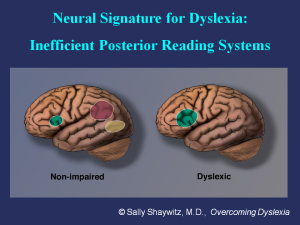Children with dyslexia will experience struggles with learning and with life. Our world turns around language either written or spoken. If a child has difficulties with the language world he/she will experience stress.
Children with dyslexia can experience low self-esteem and even self-worth. They can believe that they are a failure and this can lead them to rebel or be depressed. For example, a child who can’t spell well at grade 2 believes he/she is not smart. Despite the fact that there is no relationships between intelligence and spelling children will believe that they are not smart. Let’s face it reading and writing skills define a child’s perception of his/her intelligence. When a child gets told over and over again, “we know you can do this, your smart,” but can’t read, defeat sets in and often other manipulative behaviors can be experienced. Children with dyslexia aren’t “lazy” or “unmotivated.” Helping teachers learn to support children with dyslexia should be at the top of the agenda in the beginning of the year staff meetings. Neuroscience has allowed researchers to not only pinpoint the areas of the brain affected by dyslexia, but also measure how reading treatments change the brain’s ability to process written words. 
Much has been researched about dyslexia today. It is vital for educators to know the difference and the symptoms of this learning disability. Up to date knowledge will help teachers set up a process or format of teaching in order to help students get on with regular schooling. Thanks to Sally Shaywitz, (expert on dyslexia) we know that some types of dyslexia are more severe and children will have different needs according to the problem they are dealing with. Many professionals who have been trained to work with children with reading disabilities still don’t completely understand what neuroscience has offered in the way of “sub types” of reading disabilities. Today there are three sub types of dyslexia that are recognized and studied. Despite well documented evidence of these types of dyslexia, there are skill many myths that exist around the disability.
The myth that children with dyslexia should keep trying to learn the same way as everyone else in the classroom is still very common. They myth that individuals in the schools don’t diagnose or know about dyslexia is very common. As with many disabilities, early intervention is the key. The idea that children can outgrow dyslexia hasn’t been proven despite such claims. Early treatment can have a significant impact of cognitive processes that are used in reading. Some children will grow up using tools that are taught to them in order to get around reading.
It is not true that children who suffer from it will no longer be able to learn, this is one of the greatest myths about this learning disorder. Children despite having this learning disability can still learn but only in a different way. Learning what sub type of dyslexia your child has will ultimately determine and help guide the proper treatment. For example a child may have good phonemic skills with language and reading and be able to sound out every letter in a word, but can’t seem to recall or remember the sight word such as “the” despite having seen it many times. Treatment for this kid wouldn’t be phonics, but rather a visual or symbolic multi-sensory approach to help strengthen the cognitive pathways for recall of the previously learned word.
Another claim is that if children can read, they are not suffering from dyslexia. This is simply not true. There are some children who might just be suffering from minor dyslexia and can still be able to read. But if the symptoms worsen they might be able to lose this ability.
Today there are many strong evidence based reading programs available to children in public schools. Finding the write program for your child will mean having a good and individualized assessment. Once the appropriate reading program has been selected and implemented, an evaluation of how your child responds to this and what growth has been made will need to be discussed. Waiting six months to determine if a treatment worked is too late. Programs should be evaluated every six weeks by the educational team.
Take Home Points: Get a proper diagnosis and then seek to understand the range of treatments & therapies that will help give your child “tools” to attack reading. Learning “tools” will give your child confidence.
Dr. Rienzi Haytasingh,

